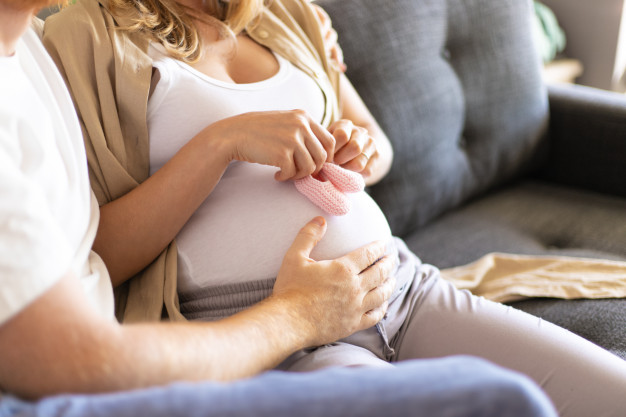7 THINGS HAPPENING IN YOUR BODY WHILE YOU ARE PREGNANT
Pregnancy is a very dynamic and powerful experience- your body adapts in ways you never thought were possible! This is no surprise, as your body is adjusting itself to nourish another life inside of you. The woman’s body undergoes several transformations during this period due to the secretion of hormones such as progesterone and estrogen. While you might love some changes, others might make you feel comfortable or even cause pain. These happen across 40 weeks, where each month brings new changes physically and emotionally. Here is a list of seven things that happen in your body while you are pregnant:
 I. Weight Gain and Fluid Retention
I. Weight Gain and Fluid Retention
Women experience weight gain during pregnancy, which increases with the growth of the fetus. This increase in weight consequently increases the body’s workload, i.e., it is more difficult to perform activities. As a result, blood and fluids’ circulation, especially in the lower part of the body, slows down. This leads to the retention of fluids and causes the swelling of limbs. Hence, pregnant women are advised to avoid long periods of standing. Caffeine and sodium lead to more fluid retention, so it must be avoided; however, potassium intake reduces fluid retention.
II. Increase in Blood Volume
Right from the first weeks of pregnancy, the volume of blood and plasma in the mother’s body increases from 30 to 50 percent. This is because your heart is working more efficiently, leading to the pumping of more blood with every heartbeat. This extra blood and plasma are instrumental in the development of the fetus. Gynecologists also suggest that this extra blood flow helps to avoid blood risks like hemorrhage. The entire cardiovascular system is adjusted to welcome the baby, leading to an elevated resting heart rate. The growing uterus also exerts pressure on the veins causing the slowing of blood during its return to the heart.
Also Read: How to Track your Basal Body Temperature and Ovulation?
III. Your Shoe Size gets Bigger
As previously mentioned, there is a lot of fluid retention during pregnancy, affecting your lower limbs. Pregnancy often causes feet and ankles to swell up. A study conducted by the University of Iowa showed that the production of relaxin, a hormone secreted by the ovaries and placenta during pregnancy, causes the arch of your foot to flatten. Furthermore, the increased weight of your body pressing on your foot loosens up your ligaments even more. Sixty to seventy percent of the women in the study reported that their feet had become wider and longer. However, this fluid dissipates after delivery, and hence, you can wear your favorite shoes again!
IV. You develop Brain Fog
A study in the Journal of Clinical and Experimental Neuropsychology revealed that almost 80 percent of pregnant women show symptoms of memory impairment. While the cause is largely unknown, doctors believe that this results from pregnancy-related hormonal changes and sleep deprivation or stress. Sometimes, this even extends to the period after the baby is born due to the overwhelming emotions and tasks associated with new motherhood.
V. Joint Mobility
The secretion of relaxin is to create more space around a woman’s pelvis for the growing fetus. This hormone loosens ligaments in the pelvis for comfortable labor and delivery and stretches ligaments and joints in other parts of the body. Unfortunately, this often causes sciatica which is the pain along the sciatic nerve- which begins at the lower back and extends up to your leg. Overall, relaxin causes some amount of instability due to the loosening of ligaments. This puts you at a larger risk of injuring yourself, especially in the region around your pelvis and back, and your knees. Doctors always advise pregnant women to exercise and lift objects slowly so that no sudden or jerking moment causes any pain or damage.
Also Read: Ovulation- how long does it last?
VI. Sensory Changes
Pregnancy has a very dramatic impact on the sensory experience as it affects the vision, taste, and smell. Pregnant women often face short-sightedness, which lasts only during pregnancy. Some women even report blurry vision. The sense of taste often becomes extreme as pregnant women’s tolerance of various tastes, including sourness, saltiness, and sweetness, increases drastically. This is due to dysgeusia, which is a diluted sense of taste. Many women also report a metallic taste in the mouth, which often causes nausea or vomiting. There is also a heightened sense of smell leading to sensitivity to specific odors, often meat.
VII. Mood Swings
Mood Swings during pregnancy are caused due to many factors. The main reason is pregnancy hormones – estrogen and progesterone. In the early stages of gestation, the secretion of these hormones increases significantly. Estrogen plays an important role in the part of the brain that regulates mood. Hence, estrogen secretion often causes a sense of irritability, anxiety, and even depression among pregnant women. Progesterone’s role is different as it aims to loosen the joints and muscles in the woman’s body. Consequently, it causes fatigue and sadness. Beyond hormonal imbalances, sleep deprivation and the general stress around pregnancy can cause irritability and mood swings.
To read more visit https://drdad.in
Comments
Post a Comment